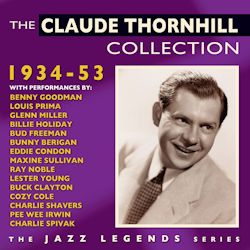Disc1
1 - Take My Word
2 - Jamaica Shout
3 - In a Little Spanish Town
4 - Way Down Yonder in New Orleans
5 - The Buzzard
6 - Take My Heart
7 - Stop You're Breaking My Heart (With Maxine Sullivan)
8 - Gone With the Wind (With Maxine Sullivan)
9 - Loch Lomond
10 - He's Funny That Way
11 - The Moon Looks Down and Laughs
12 - I Wish I Had You
13 - Down the Old Ox Road
14 - Love Tales
15 - Hungarian Dance No. 5
16 - Portrait of a Guinea Farm
17 - Snowfall
18 - Where Or When
19 - Le Papillon
20 - Rustle of Spring
21 - Autumn Nocturne
22 - Where Has My Little Dog Gone
23 - Somebody Nobody Loves
24 - Somebody Else Is Taking My Place
25 - Be Careful It's My Heart
Disc 2
1 - Buster's Last Stand
2 - There's a Small Hotel
3 - I Don't Know Why
4 - Under the Willow Tree
5 - Arab Dance
6 - A Sunday Kind of Love
7 - I Get the Blues When It Rains
8 - Early Autumn
9 - The Troubadour
10 - La Paloma
11 - Warsaw Concerto
12 - Anthropology
13 - Sorta Kind
14 - Love for Love
15 - Robbins' Nest
16 - Polka Dots and Moonbeams
17 - Donna Lee
18 - Yardbird Suite
19 - Let's Call It a Day
20 - To Each His Own
21 - Medley: When I'm With You/Puttin' and Takin'/By the Rippling Stream
Claude Thornhill (piano and arranger) with his Orchestra; and with Benny Goodman and his Music Hall Orchestra: Louis Prima and his New Orleans Gang: Glenn
Miller and his Orchestra: Ray Noble and his Orchestra: Bud Freeman and his Windy City Five: Dick McDonough and his Orchestra: Maxine Sullivan’s Orchestra:
Billie Holiday and her Orchestra
Recorded 1934-53 [73:01 + 72:20]
Claude Thornhill’s principal innovations lay in his use of colour and texture. By the time he made his best records he was employing ingenious
orchestrations that included the use of French horns and tubas – and would even go to the extent of having six clarinets playing in unison. This twofer
charts his career from the pre-war days as a sideman and the post-war years when he came into his own as a bandleader. Those engine-room war years saw the
enlisting of arranger Gil Evans, whose embryonic work can also be heard as the two, in tandem, took the band in new directions.
Thornhill moved in expensive circles in the mid-thirties, being on board with Benny Goodman, Ray Noble, Glenn Miller and acting as pianist for a varied
range of singers – Billie Holiday (three tracks, including He’s Funny That Way) and Maxine Sullivan, whose four tracks include the immortal
small-band Loch Lomond. If this was the limit of his contribution, one could say that he was a neat stylist, with a good ear for pastel-shaded
ballads and Jazzing the Classics, a vogue that enjoyed almost ridiculous popularity at the time. But as early as 1941 he embarked on a genre-busting
approach, which focused on colour and voice leading, the early examples of which – say, Portrait of a Guinea Farm – show this forward-thinking
process in action. For some time the ballads and light classical stuff kept these innovations company – if you want to hear Grieg, Sinding and Mussorgsky
semi-swung, then this is place for you.
It was almost a bipolar band – sweet ballads one minute, cooking brass and exciting drama the next – though perhaps it would be better to say that the
popular side appealed to a mass audience whilst the harder swinging side made an appeal directly at Big Band and swing lovers. That’s the only way to
rationalise the appearance of The Snowflakes singing group and Fran Warren’s glissando-vocal style, alongside the absorption and promotion of Bop that
arrives with the 1947 tracks led by Anthropology. Having Lee Konitz on board certainly did no harm to the soloistic strengths of the band.
There are full discographies of the sessions and good notes. Transfers are pretty reasonable too. As long as you’re prepared for the variety of music
recorded by Thornhill – ballads, cod-classical, transcriptions – you’ll find the innovatory elements worth the wait.
Jonathan Woolf
